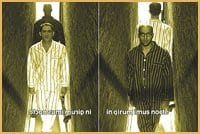Fig Trees, the video installation by John Greyson with music composed by David Wall, unfolds like the AIDS pandemic that it portrays: in distinct chapters, each different from the one before it.
“The idea was you go from room to room and each room is a scene from an opera,” Greyson says on the phone from Toronto. “Sometimes it’s video projection on four walls and sometimes it’s video monitors on a sushi train or in a minivan.”
The installation comes to Vancouver Dec 1-7 at the Scotiabank Dance Centre to commemorate World AIDS Day. “Vancouver is doing something a little different,” Greyson notes. “At the opening there’s going to be one piece that’s also performed live. But that will be just for the opening and not part of the ongoing show.”
Fig Trees is described as an avant-garde opera about the AIDS pandemic in South Africa. He compares this project to his 1993 feature film, Zero Patience, a musical about AIDS.
“What Dave Wall and I wanted to do in a sort of perverse way is use probably the most inappropriate possible form we could find to talk about one of the most urgent topics on the planet.”
The idea to tell the story as an opera was inspired by Gertrude Stein’s Four Saints in Three Acts about the lives of white Spanish saints played by an all-black cast. “The script was in classic Gertrude Stein form: absurdist. Everything about it was wonderfully frivolous and having no meaning —the sets were made of cellophane. It’s a marvelous landmark in terms of avant-garde, modernist history,” says Greyson.
“A friend had the recording and I was really bemused by this crazy story about saints; it really haunted me,” he continues, confessing he’s generally not an opera buff himself.
Greyson’s opera tells the story of Zackie Achmat, a South African AIDS activist who refused his medication until generic AIDS drugs were approved for use in his country. His strike drew international attention and a Nobel Peace Prize nomination. The tactic worked and Zackie went back on his drug regimen.
“Death for so long was the tragic narrative we were supposed to tell about AIDS and for Zackie to go on this treatment strike and seemingly go down the Mimi [à La Bohème] road of dying for the sake of his people —what could be more tear-wrenching?” asks Greyson.
“Then he turns around and takes his pills because the movement had achieved what it had set out to and in the process he disqualifies himself for operatic martyrdom. Gertrude Stein is mightily pissed off and that’s how the narrative plays out.”
When asked if he had any hesitation to do another AIDS activist piece after Zero Patience, Greyson says, “I don’t think you ever run out of stories to tell about AIDS because AIDS keeps changing.”
He admits to taking a breather from the subject after Zero Patience because he felt surrounded by it, but news of Zackie’s story in 2000 inspired him once again.
“For a moment there in ’93 I felt like I had said what I had to say about AIDS,” he reflects. “Then seven years later I have to start from scratch because this is a completely new subject and in some ways as much as I’ve thought a lot about these issues I have to rethink them completely because AIDS in South Africa is a completely different beast.”
A defining moment in Zackie’s movement and the installation is when Nelson Mandela agrees to wear one of Zackie’s “HIV-positive” T-shirts and speak publicly about two of his relatives who died of AIDS. The symbolism of the nation’s leader wearing that T-shirt marked a turning point for South Africa.
Asked if a similar campaign would have the same effect in Canada, Greyson says he doubts it.
T-shirts wouldn’t have the same meaning here, he says, pointing to the proliferation of supposedly red ribbon-inspired products. “When kids are trotting out their [red] Nanos and looking at their [red] Armani watches wearing their [red] Converse, are they really thinking about AIDS in Africa? Maaaayybee a little bit,” he says, tongue firmly in cheek. “But what have we reduced AIDS activism to? Consumerism and clothing.”
Greyson feels Zackie’s movement to have generic AIDS medications approved for South Africa has universal implications in the area of health care at large. “Primarily the generic debate has been about the developing world and when it’s an emergency, when it’s a crisis, making exceptions to patent laws,” he says.
“I think our job as global and local activists is to go further and say, ‘Hey, there are fundamental questions about pill pricing across the board —forget AIDS.” He quickly catches himself.
“Well don’t forget AIDS —add to AIDS every chronic imaginable where the treatments aren’t $10,000 a year but $100,000 a year. Why are these pills so expensive?”
Greyson suspects his Fig Trees audiences come more out of curiosity to see how Gertrude Stein’s opera and Zackie’s story become entwined with each other, than to be educated.
Fig Trees may have an important story to tell, but it is above all else, avant-garde. Both Greyson and Wall’s mission was to create an opera that would be impossible to perform on stage.
The libretto employs compositional games such as chants, inversion and subtitles. Newspaper articles and speeches are sampled into poems. “There’s a lot of play with subtitles and the idea of knowledge and what happens to knowledge when you translate it into a different language,” Greyson explains.
Asked what Zackie thinks of being the subject of an opera, Greyson says the activist feels flattered and torn. ” Zackie is not an opera queen. He’s more of a Donna Summer queen.”

 Why you can trust Xtra
Why you can trust Xtra


